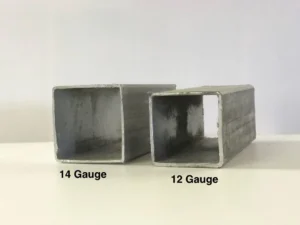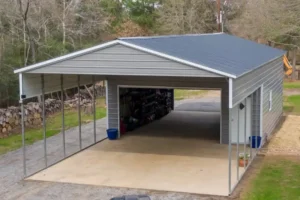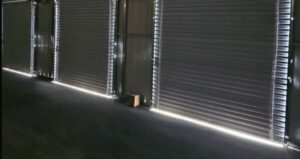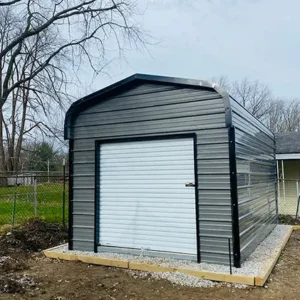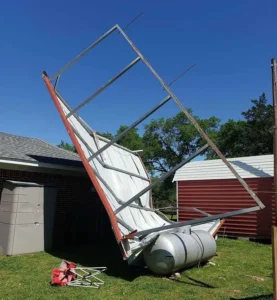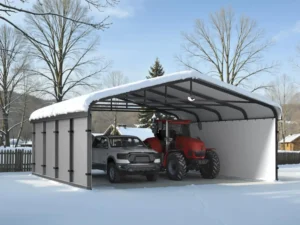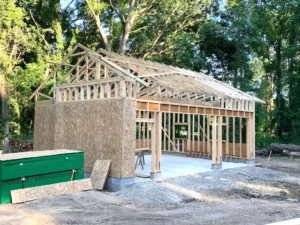8 Minute Read
Snow Loads for Metal Buildings & Carports: A Complete Guide
When winter arrives, the last thing you want is your carport or metal building collapsing under the weight of snow. Understanding snow loads isn’t just about durability—it’s about protecting your investment and ensuring safety.
Whether you’re in the heavy snowfall regions of the Northeast or dealing with occasional winter storms in the South, we’ll help you select a structure that stands strong season after season.
Questions? Call (888) 293-5588 or email [email protected] to speak with our sales team.
Get Your FREE Custom Quote
It’s quick and easy! Get a quote for an engineer certified metal building or carport today!

Manufactured in the United States

Competitive Warranties

Licensed and Insured Installers

Outstanding Customer Service
Structures That Stand Strong™
Table of Contents
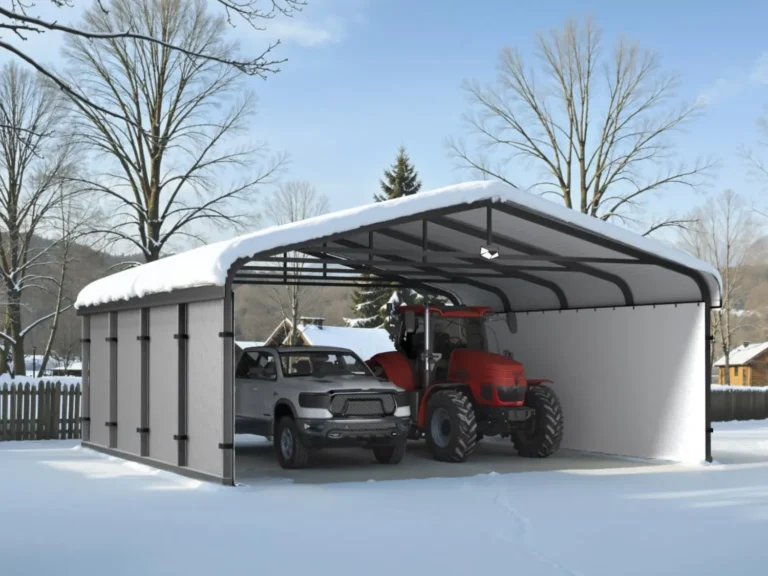
What Is a Snow Load and Why Does It Matter?
Snow load refers to the downward force exerted by accumulated snow on your structure’s roof. This weight can vary dramatically based on:
- Geographic location
- Roof pitch and design
- Snow moisture content (wet snow is significantly heavier than dry snow)
- Duration of snowfall
A structure that isn’t built to handle your area’s typical snow load isn’t just at risk of damage—it could completely collapse, potentially causing injury and destroying whatever you’re storing underneath.
Know Your Local Snow Load Requirements
Every region has specific building codes that dictate minimum snow load requirements for structures. These requirements aren’t arbitrary—they’re based on historical weather data and engineering best practices.
Local building codes typically specify snow loads in pounds per square foot (psf). For example:
- Northern states might require 70+ psf snow load capacity
- Mid-Atlantic regions often require 30-40 psf
- Southern states may have requirements as low as 5-10 psf
Important: Failing to meet local snow load requirements can:
- Void building permits
- Invalidate insurance coverage
- Result in fines from local authorities
- Lead to dangerous structural failures
How The Carport Co. Exceeds Industry Standards
At The Carport Co., we don’t just meet minimum requirements—we exceed them. We typically round up to the next factor of 10 lbs. If your area requires a 75 psf snow load rating, we will build your structure to withstand 80 psf. This engineering approach provides several benefits:
- Enhanced Durability: Your structure will handle unexpected heavy snowfalls
- Longer Lifespan: Less strain on the frame means fewer repairs over time
- Better Insurance Compliance: Exceeding code requirements often means better insurance terms
- Peace of Mind: You won’t need to rush to clear snow during heavy storms
Our galvanized tube steel construction creates a robust framework designed to distribute weight evenly, preventing weak points where snow accumulation could cause damage.
Using Our Wind and Snow Load Calculator
We’ve made it simple to determine the exact requirements for your location with our Wind and Snow Load Tool. This tool uses data from the ASCE Hazard tool, which is the industry standard for structural engineering calculations.
How to Use the Tool:
- Visit our Load Requirements page
- Enter your address or use the map to pinpoint your location
- Select “Risk Category 1” and “Snow” + “Wind”
- Press “View Results” to see your area’s minimum requirements
This precise, location-specific information ensures you’re not under-engineering (and risking collapse).
Factors That Affect Snow Load Capacity
Several design elements can influence how well your metal building or carport handles snow:
Roof Pitch
A steeper roof allows snow to slide off more easily, reducing accumulated weight. Our Custom Quote tool allows you to customize the pitch of your roof. The industry standard is 3/12—that means for every 12 inches your roof goes over, it will rise 3 inches.
Even though the industry standard is 3/12, we always recommend upgrading to a 4/12 pitch if it’s within your budget. 3/12 pitches used to be called “flick roofs” because they would build up a significant weight of snow before “flicking” it off. A 4/12 pitch ensures snow slides off quickly.
Frame Spacing
Closer frame spacing creates a stronger structure that can support more weight. In heavy snow regions, we often recommend reducing spacing between frames.
Bracing and Reinforcement
Additional bracing at key stress points significantly increases snow load capacity. In certain regions, we use additional bracing, such as 3 ft diagonal reinforcement braces to exceed local regulations and increase strength.
Material Gauge
The thickness of metal used in your structure directly impacts its strength. Whilst 12-gauge steel is only .003 inches thicker than 14-gauge steel, that difference can mean the difference between a building standing strong, or collapsing after a winter storm.
Read more: 14 Gauge vs 12 Gauge Steel Framing
Customizing Your Structure for Snow Loads
When designing your carport or metal building in a snow-prone area, consider:
- Vertical Roof Style: This design allows snow to slide off more easily than horizontal panels
- Additional Supports: Extra columns or braces can be added to high-snow designs
- Enclosed vs. Open: Fully enclosed buildings typically handle snow better than open carports
- Roof Extensions: Proper overhang design prevents snow from accumulating at critical structural points
- Roof Pitch: Increasing roof pitch allows snow to quickly slide off the roof before it has the chance to accumulate
Our team can help you customize these elements through our Get Quote page or by using our 3D Builder.
Snow Loads of Different Truss Spacings
Snow loads vary by manufacturer, but this photo should give a good baseline for structures built with 14 gauge or 12 gauge galvanized steel tubing and 29 gauge or 26 gauge sheet meta.
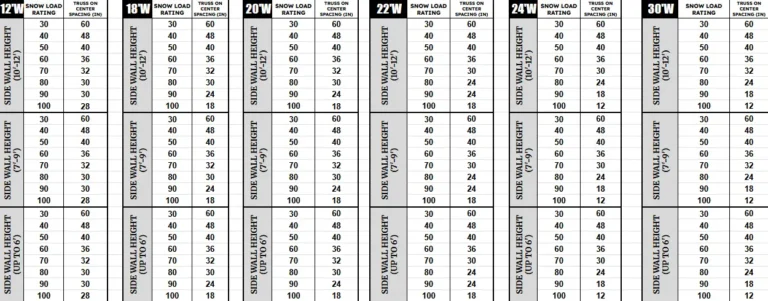
Calculating How to Increase Your Snow Load
As an example of how to increase your snow load, we’ll use the state where we are HQed, Indiana, and a standard 12x20x6 carport.
In Indiana, we build 5 ft on center (60 inch spacing). This means a 20′ long carport would have 5 trusses (0 ft, 5 ft, 10 ft, 15 ft, 20ft).
To get to a 50 lb snow load, we would require a spacing of 40 inches. 12 inches in a foot, multiplied by the 20 feet length is 240 inches. If we take this number, and dive by a 40 inch spacing, then add the truss at 0′ we can see we need to have 7 total trusses.
Since we already had 5 trusses, we only need to add 2 more to reach the 7 trusses mark.
Real-World Examples
Our Photos page showcases structures we’ve built in various climates. You’ll notice that buildings in northern states often feature:
- Steeper roof pitches
- Closer frame spacing
- Reinforced corner bracing
- Heavier gauge materials
These design adaptations aren’t just theoretical—they’re proven solutions that have protected our customers’ investments through multiple harsh winters.
Maintaining Your Structure During Winter
Even the best-designed metal building needs proper maintenance during snow season:
- Regular Inspection: Check for any bent components or loose connections before snow season
- Snow Removal: While our buildings exceed requirements, removing excessive snow accumulation (especially uneven accumulation) is still recommended
- Ice Dam Prevention: Ensure proper insulation and ventilation if your building is enclosed
- Drainage Clearing: Keep the area around your structure clear so melting snow can drain properly
Why Choose The Carport Co. for Your Carport or Metal Building?
When you choose The Carport Co., you’re not just buying a metal building or carport—you’re getting a partner who’s committed to your satisfaction. Here’s what sets us apart:
Competitive Pricing: All of our pricing is either factory-direct, or less than factory direct through dealer exclusive sales and discounts.
Nationwide Coverage: We serve the majority of the United States, bringing durable carports to your doorstep (or driveway).
Premium Materials: Our metal buildings are made from prefabricated tube steel (galvanized steel), available in both 14-gauge and 12-gauge for added strength and durability.
Expert Guidance: Our team is here to help you every step of the way, from choosing the right structure to installation.
Table of Contents
Frequently Asked Questions
How much snow can a standard metal carport hold?
Steel carports can hold up to 90 psf if engineered and installed properly. Our carports are engineer certified, and we always exceed local regulations.
Do I need to remove snow from my metal building roof?
While our structures are designed to handle local snow loads, removing excessive snow (especially if it’s unevenly distributed) can extend your building’s lifespan. For safety, use a roof rake with an extension handle rather than climbing onto the structure.
To avoid having to do this, we recommend upgrading your roof pitch to 4/12.
How do I know if my existing carport can handle heavy snow?
Check the certification documents provided when your carport was installed. If you don’t have these, look for signs of stress during snowfall, such as creaking sounds, visible bending, or deflection of the roof. When in doubt, have a professional inspection performed.
Use our Snow Load Calculator to determine minimum snow loads for your area.
Are metal buildings better than wooden structures for snow loads?
Metal buildings typically offer better snow load performance than comparable wooden structures because the galvanized steel frames distribute weight more evenly and don’t suffer from moisture-related weakening that can affect wood during freeze-thaw cycles.
How do wind loads and snow loads interract?
Wind can create uneven snow distribution on your roof, causing stress points. Our Wind and Snow Load Tool calculates both factors to ensure your structure can handle these combined forces. In particularly windy snow-prone areas, we may recommend additional bracing.
Can I install a metal building myself in a high snow load area?
While DIY installation is possible, we strongly recommend professional installation for areas with significant snow loads. Proper anchoring and precise assembly are critical for structural integrity under heavy snow conditions.
Will a higher snow load rating significantly increase the cost of my carport?
While there is some cost increase for higher snow load ratings due to additional materials and engineering, the difference is often less than customers expect—especially when considering the protection it provides for both the structure and its contents. For a tailor made quote, reach out today.
Ready to Begin Your Project?
Do you think The Carport Co. would be a good fit for you? We’d love to earn your business. Fill out the quote form, and one of our friendly representatives will be in touch with you shortly. We’re here to answer questions you may have, provide personalized recommendations, and get you an estimate on your project.
To speak with someone, call (888) 293-5588 or email [email protected].
Don’t miss out on the opportunity to enhance your property with a durable, versatile, and visually appealing metal structure. Contact The Carport Co. today and experience what we can do.
Visit our 3D Builder to design your own structure!
Get Your FREE Custom Quote
No-obligation, 100% FREE quote, delivered in minutes.
The Ultimate Buyer’s Guide is a collection of articles by The Carport Co. These articles have been catered to first time steel and metal carport, garage, and commercial building buyers. Our goal is to share as much information with customers as possible, to help make informed decisions, and ensure a customer doesn’t discover an addition they would have liked to added at the time of sale, but was not aware of the option’s existence.
Here is a preview of a few articles. To view the full Buyer’s Guide, please visit the Ultimate Buyer’s Guide page.
